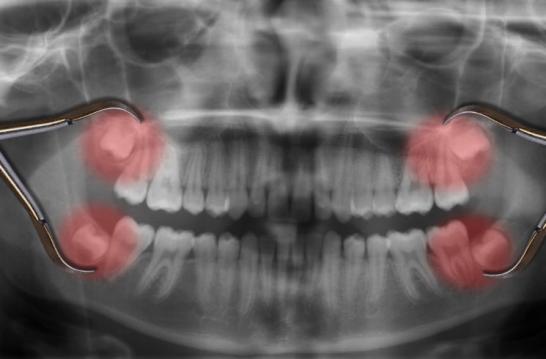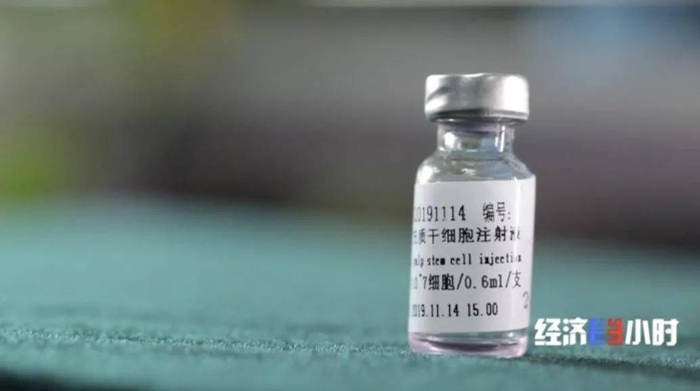Can the Extracted Wisdom Teeth Still be Used on Yourself?
Perhaps in the near future, our missing tooth can regrow easily.
When it comes to useless tissues of human body, apart from hair, wisdom teeth are probably the first thing that comes to our mind, aren't they?
More than 70% of people will develop wisdom teeth, and a considerable number of wisdom teeth need to be removed surgically (i.e., what we call wisdom tooth extraction).
However, how can we desert sound “human tissues” as we wish?
Why should we pull out wisdom teeth?
Before figuring out why wisdom teeth should be pulled out, we must first clarify the concept of wisdom teeth.
The scientific name of wisdom teeth is third molar. They are located in the innermost position of alveolar bone, There are 4 wisdom teeth in total (but not all of them grow out), and most of them sprout at the age of 20 or so.
0-4 wisdom teeth may grow out. Image source: clevelandclinic
If wisdom teeth grew out obediently like other teeth, probably they wouldn't have such a high awareness now. As a matter of fact, wisdom teeth are like a little trick evolution plays on us: as human jaws shrink, there is increasingly inadequate room for wisdom teeth. With this, this “extra” tooth causes us more and more problems.
If there isn't enough room for growth, wisdom teeth may squeeze out adjacent teeth and make them grow badly, as well. Due to their innermost position, it is difficult to clean wisdom teeth, and inadequate cleaning is likely to induced dental caries and even inflammation. Some wisdom teeth are not paired up and down (not both the upper and lower wisdom teeth on the same side grow out), which may affect occlusion. There are also some wisdom teeth that are crooked and seriously affect adjacent teeth and periodontal tissues. Future trouble cannot be avoided forever unless these wisdom teeth are pulled out.
Misbehaving wisdom teeth like this cannot remain. Image source: wikipedia
Of course, not all wisdom teeth need to be pulled out. Straight and healthy wisdom teeth and wisdom teeth that haven't sprouted won't exert an adverse effect on oral health, so there is no need to take pains to pull them out.
Are the extracted wisdom teeth still useful?
Then again, now that extracted wisdom teeth are “useless tissues of human body”, are they still useful?
For most people, they are naturally useless, but for those whose first and second molars are missing, wisdom teeth are probably very crucial.
The technique to turn wisdom teeth into wealth is called autologous tooth transplantation. The basic operation is that the dentist removes one of your teeth and transplants it to another place where the tooth is missing. The most common practice is to remove third molar (wisdom tooth) to replace a molar (first or second molars) that is damaged by dental caries, trauma or gingival disease.
Autologous tooth transplantation. To extract the upper right wisdom tooth and transplant it to the position of upper right first molar. Image source: Wikipedia
The technique of autologous transplantation of wisdom teeth is relatively mature. Clinical studies have shown that the success rate of surgery is more than 90%. In addition, once the transplantation turns out a success, the wisdom teeth transplanted to a different position can often be maintained for a long time, with a 1-year survival rate of 98% and a 5-year survival rate of 90.5%. This kind of autologous graft mode also avoids the risk of immunological rejection and is safer for patients.
Compared with dental implant, autologous graft also has obvious advantages. The transplanted tooth can move with the growth of the lower jaw to maintain a proper position. In addition, the transplanted tooth retains nerves, so that it can respond to pressure and facilitate chewing. What's more, the flexibility of natural teeth allows them to deform appropriately when encountering pressure. This can effectively avoid falloff, crack and other problems of dental implants.
Definitely, although autologous transplantation of wisdom teeth has many advantages, the applicable conditions are slightly harsh. There are limited donor teeth to choose from, for normally a person can only have four wisdom teeth. Furthermore, wisdom teeth are only suitable for replacing molars. This doesn't mean that wisdom teeth cannot survive in other root positions, but that they are not aesthetic and don't meet the purpose of tooth transplantation. More importantly, only wisdom teeth that are not fully developed are most suitable for transplantation. If this opportunity is missed, the success rate of transplantation will greatly decrease (so autologous transplantation of wisdom teeth is more effective for young adults).
Therefore, although autologous transplantation of wisdom teeth is good, most people with tooth defects can't use this method, and they have to choose expensive dental implant.
Is there any way to “regenerate” a defective tooth?
Tooth regeneration is not a dream
Researchers did find a way.
Not long ago, a new drug called “dental pulp mesenchymal stem cells” entered Phase II clinical trial. This drug is mainly suitable for patients whose teeth are “crumbling” due to periodontitis and other diseases. By injecting “dental pulp mesenchymal stem cells” into diseased parts, we can make the originally damaged alveolar bone completely regrow. In this way, the tooth that was previously loose due to alveolar bone defect can survive.
Dental pulp mesenchymal stem cells. See the watermark the image source
If the tooth has already fallen off, biological root regeneration and whole tooth regeneration may come in handy. Currently, it has been proved that odontogenic mesenchymal stem cells can successfully regenerate roots and periodontal tissues without immunological rejection. The research on whole tooth regeneration has also yielded astonishing results. Researchers have successfully regrown occlusal teeth in the jaws of mice, monkeys, miniature pigs and other laboratory animals.
Perhaps in the near future, our missing tooth can regrow easily.
Reference:
[1]Wang Shu, He Juan and Lan Peng. The clinical research progress in autotransplantation of third molar repairing missing teeth [J]. Chinese Journal of Geriatric Dentistry, 2016, 14(06):364-367.
[2]Angelova Volponi A, Zaugg LK, Neves V, Liu Y, Sharpe PT. Tooth Repair and Regeneration. Curr Oral Health Rep. 2018;5(4):295-303.



